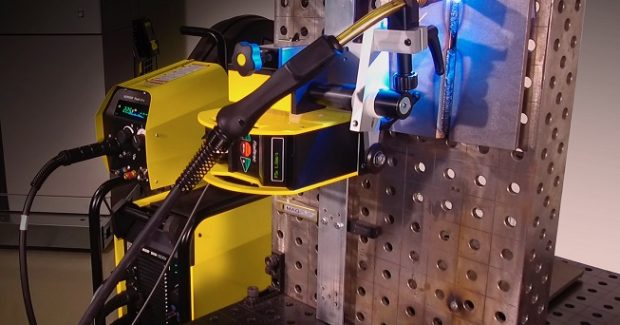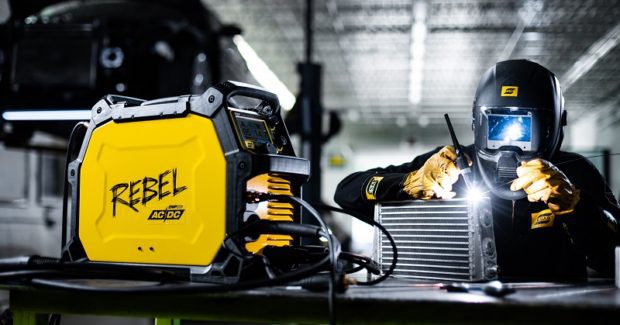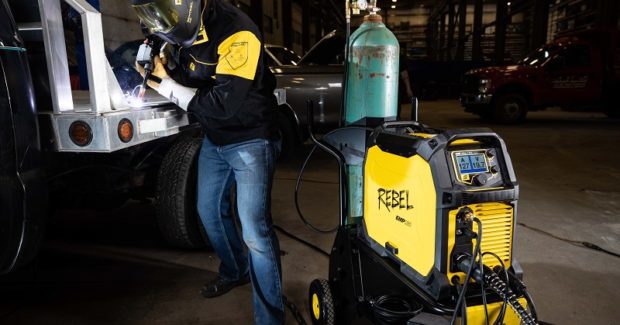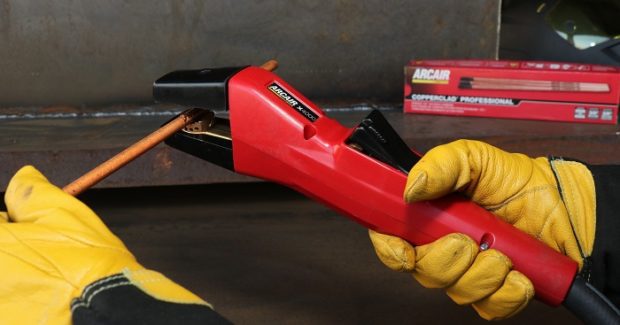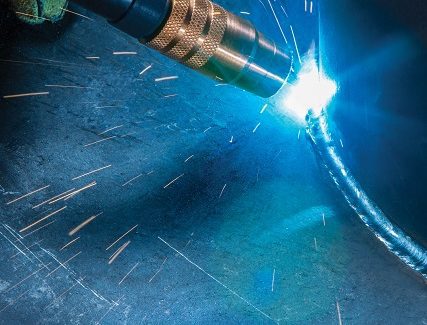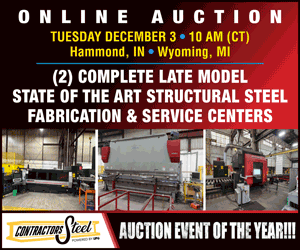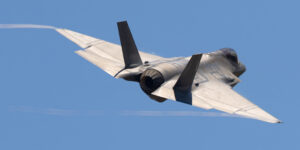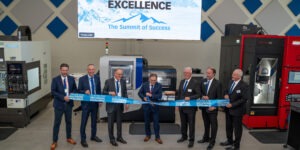Battery-Powered, Rail-Mounted Tractors for Mechanized MIG/MAG Welding
ESAB offers the Railtrac B42V rail-mounted tractor with a new weaving unit and the compact Miggytrac B501 battery-operated tractor for flexible and consistent mechanized welding of long and even not-so-long joints and seams.
Posted: December 7, 2018
Mechanized welding systems from ESAB Welding & Cutting Products (Denton, TX) include their Railtrac™ B42V (a rail-mounted tractor with a new weaving unit), the Railtrac BV2000 (a rail-mounted tractor for rail hardfacing), the Miggytrac™ B501 (compact, battery-operated tractor) and the Miggytrac B5001 (compact, programmable tractor). “Four great reasons to consider mechanized welding for long and even not-so-long joints and seams: productivity, consistency, flexibility and ergonomics,” says Edward Hansen, the global director of product management for flexible automation at ESAB. Welding tractors increase travel speeds/deposition rates by 100 percent compared to manual welding. They move faster, don’t need to stop for repositioning and enable welding with higher parameters and/or larger diameter wires. By making continuous welds, tractors reduce rework associated with start/stop defects. In applications where customers expect uniform weld bead profile and penetration, mechanized tractors deliver consistency without the cost or complexity of automation.
“These tractors feature compact, lightweight portability and easy disassembly, making it easy to move them to the work site,” adds Hansen. “They also reduce operator stress by reducing fume and UV radiation exposure, as well as reduce welding in uncomfortable positions.” The Railtrac B42V is a universal rail-mounted tractor for welding or cutting that operates in the flat, horizontal or vertical positions. It features the new W8000 remote weaving unit for making weave welds up to 80 mm (0 to 3.14 in) wide and for weld path tracking. Operators can program weave patterns, travel speeds and control voltage and wire feed speed for five standard programs. Stepper motors for both the drive and weave functions ensure smooth operation and high precision. This tractor works with any wire feeder, but connecting it to an ESAB wire feeder enables adjustment of weld parameters and arc start and stop.
For added flexibility, the Railtrac can be powered with 42V from the power source or an 18V Makita rechargeable battery that is hot-swappable for continuous operation. Also a rail-mounted tractor, the Railtrac BV2000 can be configured to create the optimal system for mechanized rail hardfacing applications. Its controls include six standard programs.
The Miggytrac B501 is a compact, battery-operated tractor that embodies affordability and simplicity. Other than clamping a torch in the holder, there is no physical connection between the tractor and the power source. This tractor also works with any wire feeder, but connecting it to an ESAB wire feeder enables adjustment of weld parameters and arc start and stop. A color TFT LCD display with an intuitive, modern interface enables operators to adjust multiple functions to improve weld quality and program weld patterns. “The TFT display separates the B501 from the competition,” notes Hansen. “It provides a better user-experience and adds more functionality. For example, users can program a faster intermittent travel speed between stitch welds (up to 170 cm/min) to reduce cycle time. To reduce seam defects at the end of a weld, users can adjust crater fill and back fill functions.”
All Miggytracs use stepper motor drives to provide smooth travel at low and high speeds while high-friction wheels guarantee stable movement, even on inclined surfaces up to 45 deg. They can be powered by an 18V Makita rechargeable battery that is hot-swappable for continuous operation. The Miggytrac B501 can also be powered with 42V from the power source.
ESAB also offers the Rebel™ EMP 205ic AC/DC, the world’s first true all-process, portable, inverter-based welding system that enables users to TIG weld with AC and DC outputs, MIG weld with solid wires (steel, stainless or aluminum), Flux-Cored weld with gas-shielded and self-shielded wires and Stick weld. “For professional fabricators or tradesmen who want to weld all metals with all processes and use only a single unit, the ultimate welder has always been a multi-process CC/CV power source with an AC/DC TIG output,” explains Doug Smith, the product business manager of arc equipment at ESAB. “We have delivered that innovation with the Rebel EMP 205ic AC/DC.” He notes that previous all-process units required additional controls or accessories or sacrificed arc performance in one or more processes. “This system offers best-in-class performance in all processes,” adds Smith. “Users were very adamant not to compromise Rebel’s MIG, TIG-DC and STICK capability, especially on a 120V input line. They simply wanted us to add full functional TIG-AC capability in the same housing, and we delivered.”
Operators can use the AC output to TIG weld aluminum, the DC output to TIG weld mild steel or stainless steel and the MIG output to weld steel. It can weld material up to ¼ in thick with a single pass using any process. The MSRP is $2,999. Widely considered the most challenging welding process, TIG welding provides more control over the weld bead profile and appearance. Rebel EMP 205ic AC/DC helps operators achieve better results by providing the type of advanced TIG controls found on industrial units. Through its color TFT LCD interface, operators can adjust:
- AC wave balance control from 60 to 90 percent electrode negative (EN). More EN improves penetration, while reducing EN adds more “cleaning action” that removes aluminum oxide.
- AC frequency control adjustable from 25 to 400 Hz. Higher frequencies produce a narrower, more intense arc cone that helps direct the arc at the root of the joint in a fillet weld. They also narrow bead width and increase penetration and travel speeds.
- Pulsed DC TIG with outputs between one and 500 pulses per second (PPS). Stainless steel fabricators and those working with thin metals or other heat-sensitive applications use pulsed DC TIG to control heat input, narrow the weld bead profile and increase travel speed. A slow frequency, such as one PPS, acts as a metronome so that welders can establish a good cadence for adding filler rod.
- Amplitude offset. Adjust either EN or EP amperage to control the energy into the workpiece, as well as cleaning action. Adjusting EN will direct more energy into the workpiece and remove heat from the tungsten to create a smaller bead profile, improve penetration and reduce preheat on thicker material while using a smaller tungsten. Increasing EP will allow additional cleaning action while maintaining a level of energy directed into the workpiece.
- HF (high frequency) Start. HF arc starts eliminate the need to touch the tungsten to the workpiece. Use HF TIG in applications for convenience or applications requiring non-contact arc starts. Rebel also provides for positive arc starts without HF using its Lift TIG mode.
- Upslope (ramping up current) to prevent excessive heat input during arc start and downslope to taper current at the end of a weld to help prevent crater cracking.
Rebel EMP 205ic AC/DC maintains true multi-process performance (especially welding with 6010 electrodes on 120V input line), 120V to 230V primary power flexibility, compact portability (the unit weighs 49 lb), sMIG (“smart MIG”) technology, five-handle lift points, TFT LCD operator interface, dual gas solenoid valves for connecting two different gases simultaneously and a rugged steel housing. The unit has a maximum output of 235 amps/26 volts for MIG/Flux-Cored welding, 180 amps/27.2 volts for Stick welding and 205 amps/18.2 volts for TIG welding. Its sMIG provides for quick and easy results when short circuit MIG welding. The sMIG function monitors the operator’s technique and continuously adapts to provide a stable arc and superior, repeatable welds. Professionals get the job done faster while beginners can focus on good technique instead of setting parameters.
ESAB offers the one-phase version of their Rebel EMP 285ic multi-process welder for MIG, Flux-Cored and DC Stick and TIG welding which accepts 90V to 270V primary power, provides a rated output of 285 amps at 40 percent duty cycle and maximum output of 300 amps/36 volts. The three-phase version accepts 460V to 575V primary, provides a rated output of 285 amps at 50 percent duty cycle and has a maximum output of 350 amps/36 volts. Both units weigh 70 lb. “The strong output of the Rebel EMP 285ic enables users to gain the productivity benefits of spray transfer welding with .045 in solid wires and .047 in aluminum wires, as well as weld with a wide range of .045 in and .052 in Flux-Cored wires,” notes Smith. This multiprocess welder also handles the larger diameter Stick electrodes and TIG rods.
ESAB designs Rebel EMP welders around the filler metals most commonly used by welders and fabricators. “We focused Rebel EMP 285ic on welding a wide range of .045 in diameter wires, Rebel EMP 235ic on .035 in wires and Rebel EMP 215ic on .030 in wires,” states Smith. “This allows fabricators to maximize performance and productivity with a full system approach, giving them greater deposition rates, more penetration and less spatter.” He notes that traditional welders with similar outputs are typically single-process MIG machines that weigh about 200 lb and lack the capabilities of wire performance potential, limiting them to mostly short arc applications. Rebel EMP 285ic offers fabricators a machine with true industrial performance for shop work and the power, portability and multi-process flexibility contractors need for structural steel erection in the field.
The Rebel EMP 285ic automatically detects the correct single-phase input power from 90V to 270V. It comes wired with a 230V plug; users simply need to attach the supplied power adapter to connect to 120V power. It holds 4 in, 8 in or 12 in wire spools, features dual gas ports with solenoid valves and has optional single- and dual-cylinder carts, remote amperage controls and spool guns for MIG aluminum. This welder also features the TFT LCD color display, Basic and Advanced Mode operation and sMIG technology for quick and easy results when short circuit MIG welding. “You can actually hear sMIG fine tune the arc after a few seconds of welding, dialing in that perfect ‘sizzling bacon’ sound that signifies proper welding parameters,” smiles Smith. “This technology reduces downtime when changing parameters, helps train new operators and can improve consistency between welding stations.”
Arcair®, an ESAB brand and a name synonymous with manual carbon arc gouging, offers their AirPro™ X4000 torch and cable. While current torch models require 27 lb of grip pressure to open the torch, the AirPro X4000 opens the torch pneumatically for effortless operation. When the operator pushes the rocker switch, this torch utilizes compressed air already flowing through the torch to open the torch jaws for operators to effortlessly insert, adjust and remove carbons. As an added benefit, elimination of the lever assembly creates a lower profile torch for improved access. The rocker switch also controls the compressed air on/off function so that no air flows through the torch or cable without the operator initiating the flow. When in use, a latch mechanism locks the rocker switch in position reducing hand fatigue. The new “no-leak” air valve saves electricity and maintenance costs of the shop air compressor.
“Compressor operation and maintenance can be one of the hidden costs of carbon arc gouging,” says Jeff Henderson, the global business manager for torches and exothermic cutting systems at ESAB. “By eliminating air leaks while the torch is idle, the AirPro X4000 reduces compressor use and associated costs. In some applications and conditions, the energy savings can pay for the initial cost of the torch in a few months.” The AirPro X4000 torch and cable are rated for use with 1,000 amp systems. The torch accepts 3/16 in to ½ in pointed round, 3/8 in and 5/8 in flat and 5/8 in half-round carbons. For operators that prefer a traditional torch, Arcair will continue to offer all of its existing models, including their best-selling Professional Angle-Arc® K4000 torch.
Tweco®, another ESAB brand, has introduced the VELOCITY2™ series of MIG consumables for their Spray Master™, Classic Number and Supra SEHD series MIG torches. The heavy-duty nozzle uses a nozzle insert that is “keyed” into place and over-molded with a high temperature silicone compound, essentially producing a single part from two pieces; a copper shell crimped over the insert creates the final nozzle. The conductor tube has three enhancements, starting with producing it from a single piece of copper with machined threads to securely hold the contact tip and nozzle in place. An O-ring prevents gas leakage in the event of a downstream obstruction, while adding a silicone sleeve over the copper tube minimizes radiant heat and improves impact resistance.
“These enhancements deliver unmatched performance through a more robust design, providing less downtime and more weld time,” stated Henderson. “VELOCITY2 directly addresses heat-related issues by reducing consumable count, improving thermal conductivity and lowering operating temperature. As a result, updated VELOCITY consumables stay cooler, last longer, produce a more stable weld puddle and improve overall productivity.” These consumables feature threadless “drop-in-style” contact tips and integrate the contact tip seating area directly into the conductor tube. With medium- and heavy-duty consumables, the shielding gas flows from the conductor tube through four ports machined into the base of the contact tip. This simplified design eliminates the gas diffuser and enables the shielding gas to keep the tip up to 30 percent cooler. By running cooler, VELOCITY2 MIG consumables extend parts life by up to ten times longer in gas shielded Flux-Cored, spray transfer and pulsed spray transfer applications. In short circuit MIG applications, these consumables typically last two to three times longer than conventional consumables.
A cooler tip also reduces the ability for spatter to stick. The tip needs less cleaning, and any spatter that adheres is easier to remove. Further, spatter generally collects on one part, the nozzle, as opposed to three parts on conventional MIG front ends. “The drop-in-style tip also eliminates the hassle associated with burn backs. There’s no need to use vice-grips or welpers when the electrode fuses inside the tip,” adds Henderson. The Tweco Classic Numbered Series is an enhancement of their legendary Number Series, perhaps the most popular air-cooled MIG torches in the world since their introduction more than 40 years ago. Many operators prefer the paddle-shaped Classic handle because it can reduce hand stress in applications where the operators desire more side-to-side torch manipulation. For operators who prefer a narrower, rounded handle shape or a water-cooled torches option, there is the proven Spray Master Series.
ESAB Welding & Cutting Products, 2800 Airport Road, Denton, TX 76207, 800-372-2123, www.esabna.com.





